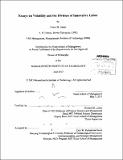Essays on volatility and the division of innovative labor
Author(s)
Samel, Hiram M
DownloadFull printable version (9.931Mb)
Other Contributors
Sloan School of Management.
Advisor
Richard M. Locke.
Terms of use
Metadata
Show full item recordAbstract
Economic liberalization has brought a widespread belief that strengthening supply-side institutions is not only a necessary condition but also a sufficient one for economic and technological development. Yet uneven growth in advanced economies and a tenacious 'middle-income' trap tests this view. This dissertation, composed of three essays, examines persistent challenges to social, technological and economic development. A key aspect of my approach is to understand whether states can control the environment in which local firms make decisions. In particular, I argue scholars have exhibited a significant bias towards the supply side of markets as sources of innovation and growth. I exploit this bias by examining cases in which the characteristics of global demand markets significantly shape firm strategies. The first essay, based on a five-year dataset of Hewlett-Packard's social audits along with extensive fieldwork in their global supply chain, identifies demand volatility as a significant cause of persistent labor standards violations in the global electronics industry, in contrast to the conventional wisdom. The second essay uses a critical case study of the Penang semiconductor cluster to examine the challenges late industrializers face when confronted with stalled technological upgrading in a world of horizontal production networks. In common with efforts to improve labor standards, the real obstacle to technological upgrading is demand volatility. I argue the case of Penang shows that it is volatility, not the search for low wages, which increasingly determines the international division of labor in emerging economies. The third essay uses a unique dataset of production firms founded with MIT-licensed technology to examine whether the U.S. captures the long-term benefits of its investments in technological innovation. Through interviews with senior managers and founders, it finds that the U.S. ecosystem provides fertile ground to start firms; yet when these firms need to take the significant leap into larger-scaled processes, both the need for additional capital as well as the search for production capabilities pulls many firms to move critical knowledge abroad. The three essays demonstrate that demand increasingly shapes global production and innovation architectures, not the opposite as is widely assumed.
Description
Thesis (Ph. D.)--Massachusetts Institute of Technology, Sloan School of Management, 2013. Cataloged from PDF version of thesis. Includes bibliographical references.
Date issued
2013Department
Sloan School of ManagementPublisher
Massachusetts Institute of Technology
Keywords
Sloan School of Management.